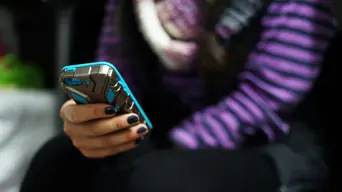AI app offers a lifeline for South Africa's abused women
Equipped with an emergency button that deploys security officers, an evidence vault and a resource centre, the app will also include an AI-driven chatbot called Zuzi that will be showcased at the Artificial Intelligence Action Summit in Paris this month.

Screen time, phone. Image: Julie Ricard on Unsplash
JOHANNESBURG - She says she was violated by police. Now she's brainstorming an AI-integrated app with a panic button that alerts private security to help other women caught in South Africa's tragically high rates of abuse.
Peaches, as the 35-year-old sex worker asked to be identified, is among the more than a third of South African women who will experience physical or sexual abuse in their lifetimes, according to UN figures.
Slender and outspoken, she was in a group of around 15 women who gathered in late January to workshop the latest update of the app developed by the nonprofit GRIT (Gender Rights In Tech).
Equipped with an emergency button that deploys security officers, an evidence vault and a resource centre, the app will also include an AI-driven chatbot called Zuzi that will be showcased at the Artificial Intelligence Action Summit in Paris this month.
"This app, it's going to give me that hope... that my human rights should be considered," Peaches told AFP, asking not to give her real name to protect her safety.
There were more than 53,000 sexual offences reported in South Africa in 2023-24, including more than 42,500 rapes, according to police figures.
That same year, 5,578 women were murdered, a 34% rise from the previous year.
In Peaches' case, she said she was forced to give two police officers "services for free" to evade arrest for prostitution.
"To me, GRIT isn't just a project, it's a necessity," founder Leanora Tima told AFP.
"I wanted to create tech-driven solutions that empower survivors, ensuring they receive the urgent help, legal guidance and emotional support they need without barriers," Tima said.
'ROADBLOCKS TO HELP'
Many cases of gender-based violence (GBV) go unreported because victims face stigma or are turned away by authorities, said GRIT lead researcher Zanele Sokatsha.
"There's a lot of roadblocks still in getting access and help," she said.
Thato, a woman in her 30s, said she endured years of physical abuse by her stepfather before she discovered help was available.
An avid football player, she said her coach realised that "some bruises were not actually related to football".
It was only when the coach took the team to an anti-GBV event in Soweto, southwest of Johannesburg, that she learned there were organisations that assist women in her situation.
"It was actually heartwarming for me to find such a space," she said, preferring to give only her first name.
GRIT's app aims to make it easier for women to access resources from their homes, where much of the abuse happens.
It has a map of nearby clinics and shelters and a digital vault where they can upload evidence like photos, videos and police reports that will be protected on GRIT's servers.
The features are based on user feedback gathered at workshops around the country.
"It will save lives," said one woman at the same workshop attended by Peaches.
The app is free, and funded by GRIT's donors including the Gates Foundation and Expertise France. It already has 12,000 users.
Once downloaded, it can work without data, making it accessible to those who cannot afford phone plans or are in rural areas with limited networks.
The chatbot Zuzi, to be released in the coming months, will be available on the app and also integrated into certain social platforms, technical lead Lebogang Sindani said.
Zuzi was initially intended to provide only practical information, like how to apply for a protection order.
But its repertoire has been broadened after feedback "that people are more interested in talking to Zuzi about... intimate things" like their health, Sindani said.
'ALL THEY KNOW'
Even if there are more services than ever to help women who are attacked and strong public condemnation of cases that make it to the media, South Africa's abuse rates remain stubbornly high.
It is "a perfect storm" of a complex history of colonisation and segregation, belief in male dominance, a lack of good role models and economic stresses, said Craig Wilkinson, founder of Father A Nation.
"No boy is born an abuser," said Wilkinson, whose nonprofit focuses on reaching men. "There's something going wrong in the journey from boy to man."
"All they know is violence," said Sandile Masiza, a coordinator of the GBV Response Team for Johannesburg's child welfare authority.
"We need more programmes that are not just going to be solely focused on victim support, but perpetrator prevention," Masiza said.
"Society has normalised violence against women and girls," UN Women GBV specialist Jennifer Acio told AFP.
"That's why we keep sharing information and trying to empower women... to know what is an abuse of their rights, to know when to report."